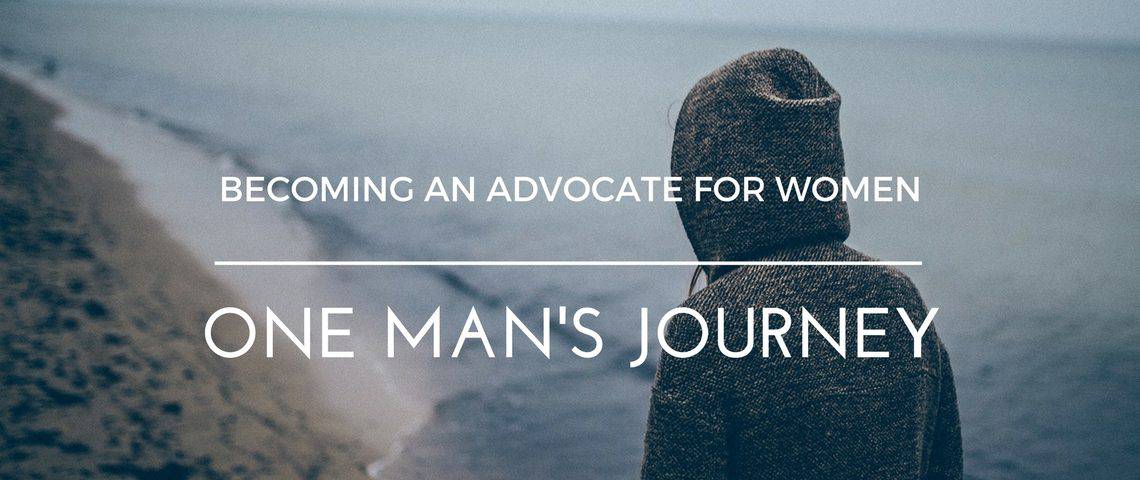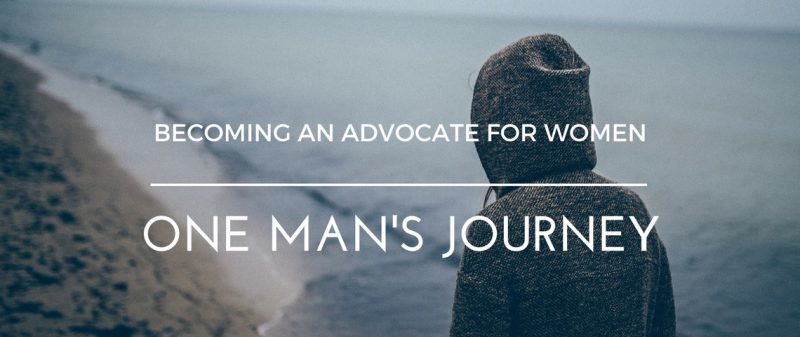Learning to be an advocate for women is difficult when you have to unlearn years of a complementarian mentality, male privilege, and the effects of centuries of patriarchy.
But I believe this is what we are called to pursue.
This has been my journey. Sometimes I think it has been difficult, but what is more difficult is seeing how women are being oppressed. Every man needs to face the messiness of what it means to be egalitarian, regardless of how uncomfortable or challenging it may be.
While at times I identify myself as egalitarian, sometimes it is more useful to say I’m a recovering sexist/complementarian/patriarchist. This reminds me I’m always on a journey in pursuing equality – not only because it means liberation for women from oppressive structures, but also because it means liberation for me. So here are a few things I have learned in my journey about being an advocate for women.
Listen
The first step I have taken is intentionally listening to the stories of women. Subscribing to a blog like this. Exposing myself to different perspectives and views than mine. Allowing them to challenge me in the way I think, speak, and act.
Listening is the first step because if we men automatically assume we know how to advocate, we are already taking a step in the wrong direction. I have learned I can’t come in with a savior mentality thinking, “here I am as an advocate, to save you women from the oppressive chains of patriarchy.” I need to listen to how women experience inequality.
If I assume men and women have the same opportunities, listening to women’s stories will challenge me. I can only know the different struggles women go through by hearing their stories. We can only know how to support women if we understand what hurdles they have to jump.
Listening also helps us reflect on our own preconceived notions or assumptions. 10 Reasons Why Men Should Not Be Pastors demonstrates through satire, how prominent sexism can be in our workplace, context, and church. It reveals how we must be attentive to what we say (or what others say), challenging any sexist notions we hear.
Educate yourself and others
It’s not enough to just listen. When we encounter sexism in various contexts, we must be ready to educate others and encourage a more egalitarian environment.
I’ve come to realize it’s not the job of women to educate men on how and why they take part in a sexist culture/context/etc. It’s something men have to actively do themselves. Part of this is remembering egalitarianism is for men too; a way of liberating ourselves from our sexist ways.
Specifically, when we are speaking with other men, we must be ready to offer a response about why something may be viewed as sexist/complementarian/patriarchal. Educating other men about inequality may be what pushes them to see this is not just a women’s issue; it’s also a men’s issue. I have found it crucial to not let sexist microaggressions pass by in my encounters with men, even (and especially) when it is uncomfortable. I have to call myself and my male friends out, always evaluating how we can promote equality, even when women are not present to hear our comments.
When I realize I’m not fully informed on an issue or stance, I research and educate myself. Pursuing equality means educating ourselves in areas where we are not fully informed on what scripture says, what women go through, how sexism functions, etc. I have realized that is not enough to believe in egalitarianism; it’s also my duty to educate myself on what it means and how to practice it. This can be done by subscribing to egalitarian blogs, reading biblical commentaries friendly to the egalitarian perspective, and researching feminist/egalitarian approaches to the workplace and church context.
Practice what you believe
These first two steps are never fully accomplished. It’s an ongoing journey where I am always striving to listen and to educate myself on how to be a better advocate. Then naturally, my response to listening and educating myself is to put into action what I have learned. It isn’t enough to believe in egalitarianism. It’s not enough to be convicted that this is what God desires for God’s people. Either I strive to be a part of the solution, or I just become a part of the problem (whether I know it or not).
This means practicing what you believe. This means preaching sermons that highlight women’s stories in scripture. This means teaching our congregations how to see God as mother as much as we have taught our congregations to see God as father. This means evaluating our language for God and using language that promotes the female imagery of God we see in Scripture. This means seeking more female leadership in our churches. It is paradoxical when a church believes in egalitarianism, but the only formal leadership position held by a woman is the children’s ministry position, if any.
I am thankful for the challenging road I have been on, always pushing myself to be an advocate for the liberation of women; and advocating for myself and other men to be liberated from our oppressive ways.
Being an advocate means understanding that God speaks through women in powerful ways, and that by neglecting or silencing their voices, we have silenced the voice of God and what God desires for our world. Throughout my journey of advocacy, I have encountered God in ways I would not have before. This has brought immense joy and I have no desire to go backward. Only forward. To the glory of God!





18 responses to “Becoming an Advocate for Women: One Man’s Journey”
Hey Alex, It is so great to know you are out there. I attend a Complementarian Church but have not become a member. I have no interest in disputing or deciding who is or is not a disciple, or who is the most important – after all Jesus Christ warned us not to. We are brothers and sisters with one head – the Godhead, and isn’t it beautiful. I was pretty shocked to find out this blessing was cast aside in the church I liked, and in so many churches.
In the Kingdom of Heaven these things don’t matter. My church felt like an obnoxious ego-bound academic management meeting (My area of work) at the all-male ‘Elders’ meeting. At the services when men and women speak it feels like the Kingdom, we serve each other, not Lord it over each other; this is the way Jesus said it would be between us. It is so sad that the world outside of the Church is more in line with the Kingdom of God in gender freedom than his bride, especially when he suffered so much to set us free.
So I will come back here to keep myself sane!
Admin here – I wanted to apologize for the delay in posting your comments! For some reason they went into our spam file over the weekend and I just found them. Thanks for your input – glad you found The Junia Project!
Thank you for your comments. I’m happy you found the Junia Project. They’ve been so helpful throughout my journey, and I hope they are helpful for you too! Blessings, Alex.
thank you for this amazing and helpful post!
Thank you for your encouragement. I’m happy my story was helpful. Blessings!
Great job here, Alex. I love that you have determined not to know how to be an advocate, but to learn how to be one… I suppose that’s something all of us need to do… listen to the ‘other’. I’m reposting to Kyria.
Happy you enjoyed it! And yes, feel free to share it. Blessings!
I think that your article has some strengths but also some weakness. I like your passion for being an advocate for women. This is commendable and gender justice/equality. Also, being an advocate for men to recognize their oppressive ways of complementarism/patriarchy is standing up for the vulnerable, marginalized and weaker members of society. This is being a voice for those who cannot speak. Now the weakness that i am seeing in your article are that the biblical egalatarian view to you is something that only pertains to women. However, biblical egalataranism is about biblical equality, biblical justice, shalom and mutuality for all people regardless of race and ethinicty, gender, social economics, native US born or immigrants. This is what biblical egalatariansim is about. Patriarchy/Complementarianim is a system of hiearachy. This is unbiblical. For me, to be an advocate of biblical egalatarism is to be an advocate for biblical equality, mutuality, biblical justice and shalom for all people of all races and ethinicties, for both genders, and immigrants and US born people. Only by advocating this view i will be able to challenge with scripture, the hierachal instutions of race and gender present in this country and around the globe. Thanks for your article.
Thank you, Alex, for cultivating self-awareness, and for your humility and honesty. Thank you for being an advocate for women. This was spot-on.
Thank you for your kind words. Blessings!
Well said, Alex. Listening is part of loving and without love were just clanging cymbals making noise, not a difference.
Well said! They go hand in hand. Thank you, Tim!
Well done! May your journey continue to be blessed as you seek to grow out of your assumptions and into the truth that sets us all free. Peace to you.
Thank you! Peace to you as well.
Thank you Alex, your efforts are appreciated by me. a woman Pastor, mother, wife and writer.
Thank you for your kind words. May you be blessed!